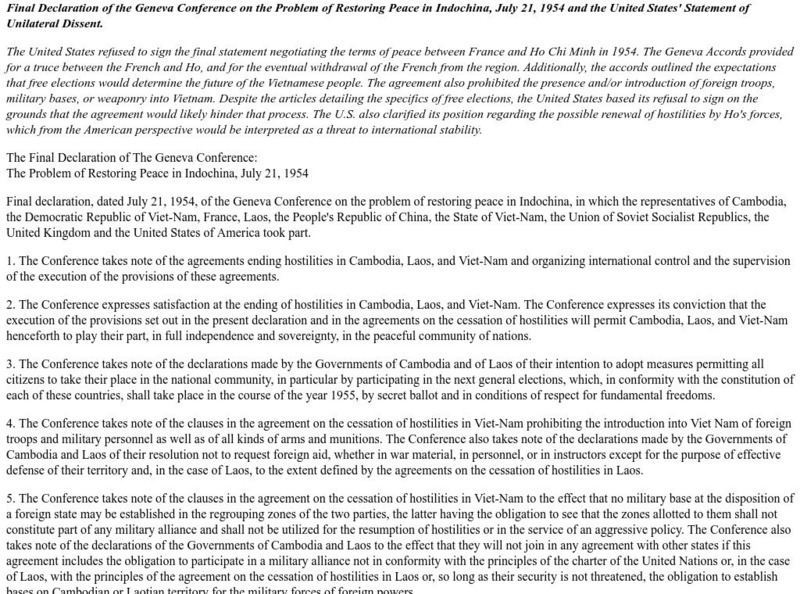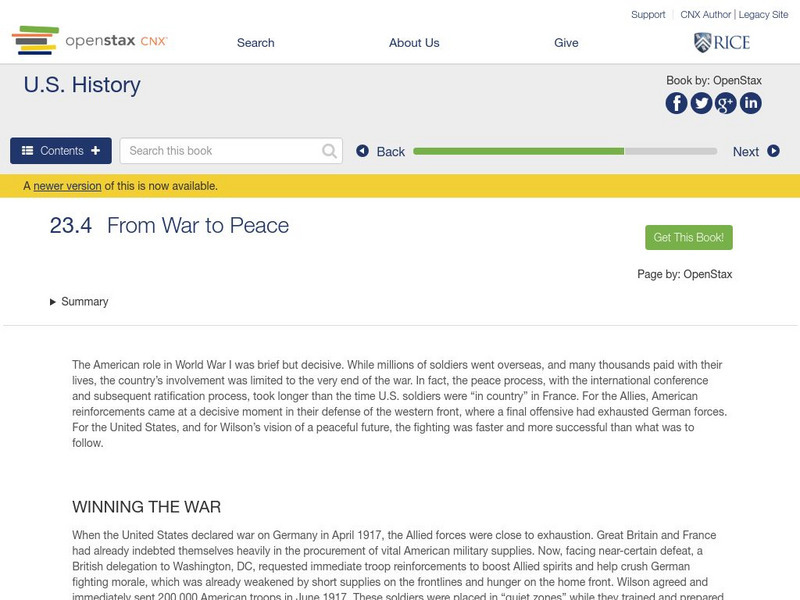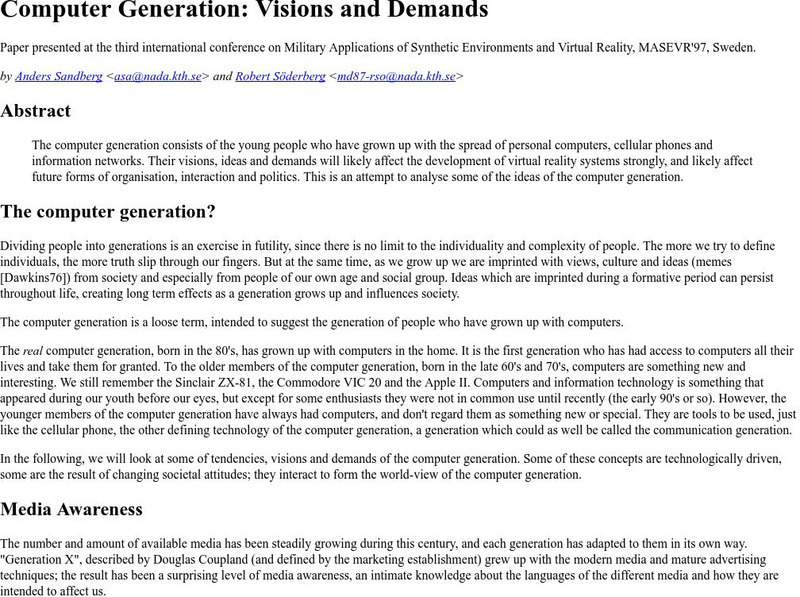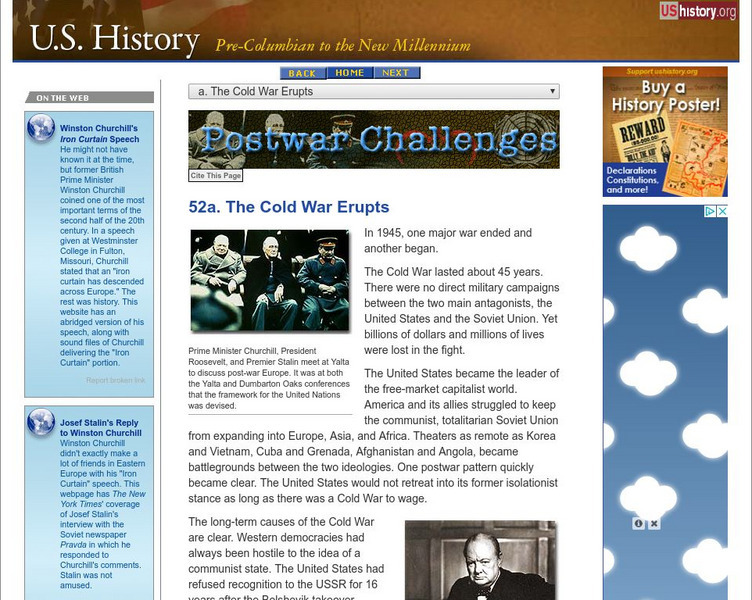PBS
Pbs: Wwii Behind Closed Doors:the Conferences
This site provides a comprehensive overview of many conferences between Franklin D. Roosevelt and Winston Churchill and the Allies' conferences with Stalin and others during World War II and includes links to related resources and media.
Digital History
Digital History: The Yalta Conference [Pdf]
This is a very extensive look at the Yalta Conference. Find the problems addressed at the conference, the enumerated possible solutions, the positions each of the Big Three leaders held, and the actual results of the conference. Included...
McGraw Hill
Final Declaration of Geneva Conference: u.s. Statement
The text of the Final Declaration of the 1954 Geneva Conference includes official U.S. statement regarding the refusal to sign and comply with Final Resolution.
Kent State University
Virginia Hamilton Conference
This resource provides information about the annual Virginia Hamilton Conference, which is all about multicultural literature for children. There is also a link to biographical information on Virginia Hamilton.
PBS
Pbs Online News Hour: Obama's 100 Days Press Conference
Provides the text and audio of President Barrack Obama's press conference delivered on his 100th day in office.
Curated OER
Unfccc: Un Climate Change Conference in Copenhagen
Copenhagen conference held in December, 2009.
Other
The Nation: Yalta: This Is What We Voted For
This article discusses the significance of the Yalta Conference, portraying the Conference's unresolved differences in a positive light. (April 2, 2009)
Library of Congress
Loc: Cold War Estrangement
This site from the Library of Congress discusses the progress of World War II, and the nature of the postwar settlement at conferences in Tehran, Yalta, and Potsdam.
Other
Portland State Center for Geography Education in Oregon
The OGA offers information about its organization, members, meetings, and conferences, as well as available grants and lesson plans and learning activities for the classroom.
Other
Washington Univ.: Alzheimer's Disease Research Center
Comprehensive site with general information about Alzheimer's disease. Provides updates on conferences and events, links to current research or related sites, and more.
Curated OER
Portrait Dr. Martin Luther King Jr.
A newspaper photograph of Dr. Martin Luther King Jr., taken during a 1964 press conference.
Stanford University
Martin Luther King, Jr. And the Global Freedom Struggle
This article takes readers through the events leading to the expansion of the Civil Rights Movement to the north through a major non-violent campaign protesting unfair housing practices in Chicago.
Vassar College
Vassar College: The Wars for Vietnam: The Documents
Document excerpts from the years 1954-1973 demonstrating U.S. support of South Vietnam. Includes links to other Vietnam sources.
Other
Isaca: Serving It Governance Professionals
This is the home site for ISACA which is devoted to information technology governance and control. The site contains membership, publication, and professional development information.
Other
Save Our Seas Organization: Home Page
Home page of the Save Our Seas Organization which seeks to protect all the oceans of the world.
OpenStax
Open Stax: Americans and the Great War 1914 1919: From War to Peace
Examines how the United States contributed during the final stages of World War I, what Woodrow Wilson believed the world should look like after the war, and why the United States did not sign the Treaty of Versailles or join the League...
PBS
Pbs: Wwii Behind Closed Doors: Prelude to Cold War
This article discusses the uneasy alliance maintained by Joseph Stalin, Winston Churchill, and Franklin D. Roosevelt during World War II and the implications of this alliance on the development of the Cold War.
Other
Rit: Computer Generation: Vision and Demand
This paper, presented at an international conference in Sweden, gives a thorough analysis of the computer generation. The authors analyze some of the tendencies, visions and demands of this technology-rich time.
Other
Lebendiges Museum Online: Potsdamer Konferenz
This site from the Lebendiges Museum Online describes the events surrounding the Potsdam Conference which decided the future of the devided Germany. The site is entirely in German.
Independence Hall Association
U.s. History: The Cold War Erupts
World War II ended in 1945 and the Cold War began immediately. Read about the mistrust Western Europe and the United States felt towards the Soviet Union and Joseph Stalin. Learn how the Soviets expanded their realm of influence and...
National Endowment for the Humanities
Neh: Edsit Ement: Empire and Identity in the American Colonies
In this lesson plan, learners will consider "Empire and Identity in the American Colonies." The plan includes worksheets and other student materials that can be found under the resource tab.
PBS
Pbs: American Experience: President Franklin D. Roosevelt
This companion to the PBS series surveys the career of the longest-serving president in U.S. history and leader through the Great Depression and World War II.
Independence Hall Association
U.s. History: 1930s Isolationism
Read about the ways the American government and people looked inward during the 1930s, isolating themselves from actions taking place in Europe and Asia.


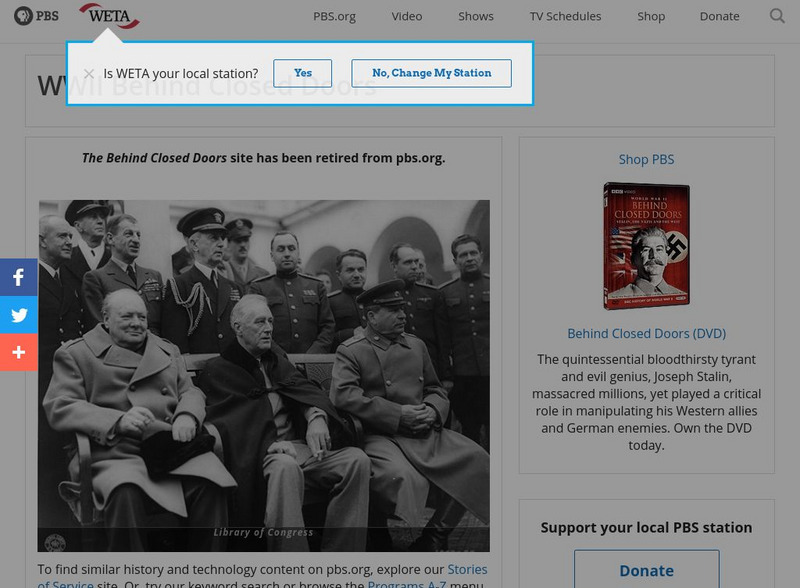
![Digital History: The Yalta Conference [Pdf] Lesson Plan Digital History: The Yalta Conference [Pdf] Lesson Plan](https://app.lp.dev.lexp.cloud/assets/images/attachment_defaults/resource/large/FPO-knovation.png)
